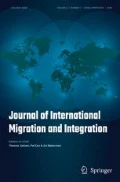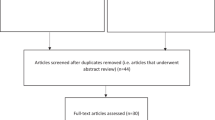Abstract
Although refugees who are accepted for resettlement in a third country are guaranteed certain rights and experience safety from war and persecution, they face many mental health challenges. Using qualitative methods and constructivist grounded theory, we explored culturally specific perspectives on trauma and recovery among Burundian, Congolese, and Iraqi refugees resettled in the USA. Eighteen semi-structured interviews provided extensive data on the meaning of productivity and work, the ways in which they index normalcy and self-sufficiency, and how they create security that facilitates the healing process. Our inductive analyses revealed that participants emphasized the relationship between productivity and healing when they described recovery from trauma. Participants also discussed individual and structural facilitators and barriers to work. Finally, prominent themes emerged around gendered roles and expectations and the ways these function in refugee resettlement contexts that are shaped by policies that demand rapid economic self-sufficiency. Taken together, these findings suggest that policies that promote underemployment and foreclose opportunities for education and professional development may contribute negatively to refugee mental health, as well as keep refugees in poverty.
Similar content being viewed by others
References
Agamben, G. (1998). Homo Sacer: sovereign power and bare life. Palo Alto: Stanford University Press.
Goodkind, J. (2005). Effectiveness of a community-based advocacy and learning program for Hmong refugees. American Journal of Community Psychology, 36(3/4), 387–408. https://doi.org/10.1007/s10464-005-8633-z.
Goodkind, J. (2006). Promoting Hmong refugee’s well-being through mutual learning: Valuingknowledge, culture, and experience. American Journal of Community Psychology, 37(1/2), 77–93. doi: https://doi.org/10.1007/s10464-005-9003-6.
Goodkind, J., Amer, S., Christian, C., Hess, J.M., Bybee, D., Isakson, B., et al. (2017). Challenges and innovations in a community-based participatory randomized controlled trial. Health Education & Behavior, 44(1), 123–130. https://doi.org/10.1177/1090198116639243.
Goodkind, Jessica, Hess, J. M., Isakson, B., LaNoue, M., Githinji, A., Roche, N., Vadnais, K., & Parker, D. P. (2014). Reducing refugee mental health disparities: A community-based intervention to address post-migration stressors with African adults. Psychological Services, 11(3), 333–46. https://doi.org/10.1037/a0035081.
Brown, A., & Sribner, T. (2014). Unfulfilled promises, future possibilities: the refugee resettlement system in the United States. Journal on Migration and Human Security, 2(2), 101–120.
Charmaz, K. (2014). Constructing grounded theory (2nd ed.). Thousand Oaks: SAGE Publications.
Dawood, N. (2011). From persecution to poverty: the costs of the U.S. Refugee Resettlement Program’s narrow emphasis on early employment. Berkeley Public Policy Journal, January 2011. https://bppj.berkeley.edu/2011/01/18/from-persecution-to-poverty-the-costs-of-the-u-s-refugee-resettlementprograms-narrow-emphasis-on-early-employment/. Accessed 11 Oct 2018.
Droždek, B., Wilson, J. P., & Turkovic, S. (2012). Assessment of PTSD in non-Western cultures: the need for new contextual and complex perspectives. In J. G. Beck, D. M. Sloan, J. G. Beck, & D. M. Sloan (Eds.), The Oxford handbook of traumatic stress disorders (pp. 302–314). New York: Oxford University Press. https://doi.org/10.1093/oxfordhb/9780195399066.013.0020.
Fassin, D., & Rechtman, R. (2009). The empire of trauma: an inquiry into the condition of victimhood. Princeton: Princeton University Press.
Haines, D. W. (2010). Safe haven?: a history of refugees in America. Sterling: Kumarian Press.
Herman, J. (1992). Trauma and recovery: the aftermath of violence—from domestic abuse to political terror. New York: HarperCollins.
Hess, J. M., Isakson, B., Githinji, A., Roche N., Vadnais, K., Parker, D. P., et al. (2014). Reducing mental health disparities through transformative learning: A social change model with refugees and students. Psychological Services 11(3), 347–356
Kirmayer, L. (2004). The cultural diversity of healing: meaning, metaphor and mechanism. British Medical Bulletin, 2004(69), 33–48. https://doi.org/10.1093/bmb/ldh006.
Kleinman, A., Das, V., & Lock, M. (1997). Social suffering. Berkeley: University of California Press.
Malkki, L. (1992). National geographic: the rooting of peoples and the territorialization of national identity among scholars and refugees. Cultural Anthropology, 7(1), 24–44.
Marsella, A. (2010). Ethnocultural aspects of PTSD: an overview of concepts, issues and treatments. Traumatology, 16(4), 17–26.
Miller, K. E. (1999). Rethinking a familiar model: psychotherapy and the mental health of refugees. Journal of Contemporary Psychotherapy, 29(4), 283–306.
Miller, K. E., Omidian, P., Quraishy, A., et al. (2006). The Afghan symptom checklist: a culturally grounded approach to mental health assessment in a conflict zone. The American Journal of Orthopsychiatry, 76(4), 423–433.
Mollica, R. F. (2006). Healing invisible wounds: paths to recovery in a violent world. Nashville: Vanderbilt University Press.
Owens, P. (2009). Reclaiming ‘Bare Life’?: against Agamben on refugees. International Relations, 23(4), 567–582.
Silove, D. (1999). The psychosocial effects of torture, mass human rights violations, and refugee trauma: toward an integrated conceptual framework. Journal of Nervous and Mental Disease, 187(4), 200–207.
Summerfield, D. (1999). A critique of seven assumptions behind psychological trauma programs in war-affected areas. Social Science and Medicine, 48, 1449–1462.
Terheggen, M., Stroebe, M., & Kleber, R. J. (2001). Western conceptualizations and eastern experience: a cross-cultural study of traumatic stress reactions among Tibetan refugees in India. Journal of Traumatic Stress, 14(2), 391–403.
UN General Assembly (1951). Convention relating to the status of refugees, 28 July 1951, United Nations, Treaty Series, vol. 189, p. 137. Available at: http://www.refworld.org/docid/3be01b964.html (accessed 21 March 2016).
United Nations High Commissioner for Refugees (UNHCR) (2016). Global trends: forced displacement in 2015. http://www.unhcr.org/en-us/statistics/unhcrstats/576408cd7/unhcr-global-trends-2015.html. Accessed on February 8, 2017.
US Government Accountability Office (2012). Refugee resettlement: greater consultation with community stakeholders could strengthen program. Washington, DC.
US Senate Committee on Foreign Relations (2010). Abandoned on arrival: implications for refugees and local communities burdened by a U.S. refugee system that is not working. Washington, DC: US Printing Office.
Wilson, J. P., & Tang, C. S. K. (2007). Cross-cultural assessment of psychological trauma and PTSD. New York: Springer Publishing.
Yakushko, O., Backhaus, A., Watson, M., Ngaruiya, K., & Gonzalez, J. (2008). Career development concerns of recent immigrants and refugees. Journal of Career Development, 34(4), 362–396. https://doi.org/10.1177/0894845308316292 Accessed 30 January 2017.
Acknowledgements
We wish to acknowledge the contributions of our community advisory council members (Jerome Ndabirorere, Freedance Nibakiza, Mohammed Alkwaz, Sulaf Alkawaz, Seyyed Qasim Sadat, Sadiqa Sadat, Hala Al-kurdi, Muslim Al-kurdi, Jean Paul Ninziza, Nina Nahimana, Marshall Jenson, Kiri Mathsen, Kresta Opperman, Ngerina Nyankundwakazi, Danielle Parker, Mandy Ortaa, and Azhar N. Al-Jarry), interviewers/interpreters (Ebtisam Ali, Ahmed Mashhadi, Cynthia Mfurakazi, Martin Ndayisenga, Sanaa Yaqoob), and all of the research participants.
Funding
This study was funded by a grant to the senior corresponding author from the National Institute on Minority Health & Health Disparities (R01MD007712).
Author information
Authors and Affiliations
Corresponding author
Rights and permissions
About this article
Cite this article
Hess, J.M., Isakson, B.L., Amer, S. et al. Refugee Mental Health and Healing: Understanding the Impact of Policies of Rapid Economic Self-sufficiency and the Importance of Meaningful Work. Int. Migration & Integration 20, 769–786 (2019). https://doi.org/10.1007/s12134-018-0628-3
Published:
Issue Date:
DOI: https://doi.org/10.1007/s12134-018-0628-3



